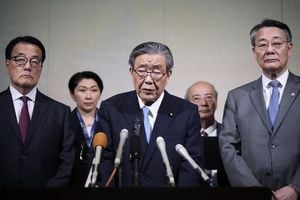Pope Francis, the head of the Catholic Church, is currently hospitalized at the Gemelli Hospital in Rome due to severe bilateral pneumonia. This hospitalization, which began on February 14, has generated significant concern not only for his health but also for the future of leadership within the Church as the pontiff navigates his advanced age of 88.
Upon his arrival at the hospital, the Vatican announced the Pope was suffering from complications stemming from prior respiratory infections, including constrictive bronchitis and polimicrobial infection affecting his airways. The latest medical bulletins from the hospital highlight the necessity for additional pharmacological interventions, indicating the complexity of his condition.
The Pope remains active to the extent possible, continuing to engage with his team and review important documents. Reports confirm he is "stable" and is showing slight improvement, particularly concerning inflammatory markers, encouraging news amid fears of potential complications. Giorgia Meloni, Italy's Prime Minister, visited him and described her encounter positively, stating, "I'm very happy to have found him attentive and receptive. We've joked as always. He hasn't lost his proverbial sense of humor." This sentiment brought some relief to the general public and the faithful who pray for his recovery.
Despite the improvements, experts have cautioned about his precarious state. Jesuit theologian Antonio Spadaro remarked, "The situation is delicate, but I didn't see any signs of alarmism," indicating the seriousness of the Pope’s condition without inciting panic among the public.
During this challenging time, the pontiff has mentioned previously his thoughts on succession and resignation. He stated, "I have already signed my resignation. I handed it to Tarcisio Bertone. If there were any impediment due to medical reasons, I would have it ready." Such comments add significant weight to discussions on the potential for future leadership changes within the Vatican- especially considering the historical precedent set by his predecessor, Pope Benedict XVI.
Understanding the health challenges of elderly leaders like Pope Francis prompts growing discussions about the stability of the papacy and governance within the Church. Spadaro predicted recently, "It appears the Pope Francis could be hospitalized between two to three weeks," hinting at potential delays to the Church's operations as the pontiff recovers.
Across the globe, the Pope’s health has prompted extensive reactions, particularly among church officials and laypeople alike. The Spanish bishops have urged their congregations to pray for his recovery, illustrating the Pope's pivotal role within the Catholic community. "We urge prayers for his quick recovery," said Archbishop José Ángel Saiz Meneses from Seville, bringing to light the intense concern surrounding the papal health and leadership.
Meanwhile, life continues relatively unchanged around St. Peter's Square, with tourists and devout parishioners showing their support for the Pope amid his absence from public life. Many expressed their affection through letters and drawings sent during his hospitalization, showcasing the deep connections he has forged within communities across the world.
The Vatican has canceled all of the Pope's public engagements until the end of the week, underscoring the need for him to recuperate without interruption. Statements from the hospital maintain, "The Holy Father's clinical conditions remain stable, and blood tests show slight improvement, especially in inflammatory markers," which are considered encouraging signs for those closely monitoring his health.
Yet, the questions surrounding potential successors loom large as conversations about the papacy evolve. The potential for the Pope's resignation, following historical precedents, opens dialogues about who could fill his pivotal role should he decide to step down. Among the names suggested by church analysts are prominent figures, including Luis Antonio Tagle and Matteo Zupp.
Given the weight of his position and the lasting influence he has had on the global Catholic community, Pope Francis’s health will continue to be watched closely. It remains to be seen how the coming weeks will impact his ability to lead, but the collective prayers and support from around the globe offer hope during these trying times.
The world watches with bated breath as the pontiff undergoes treatment and recovery, hoping for the best results for long-time leader of the Catholic faith.



